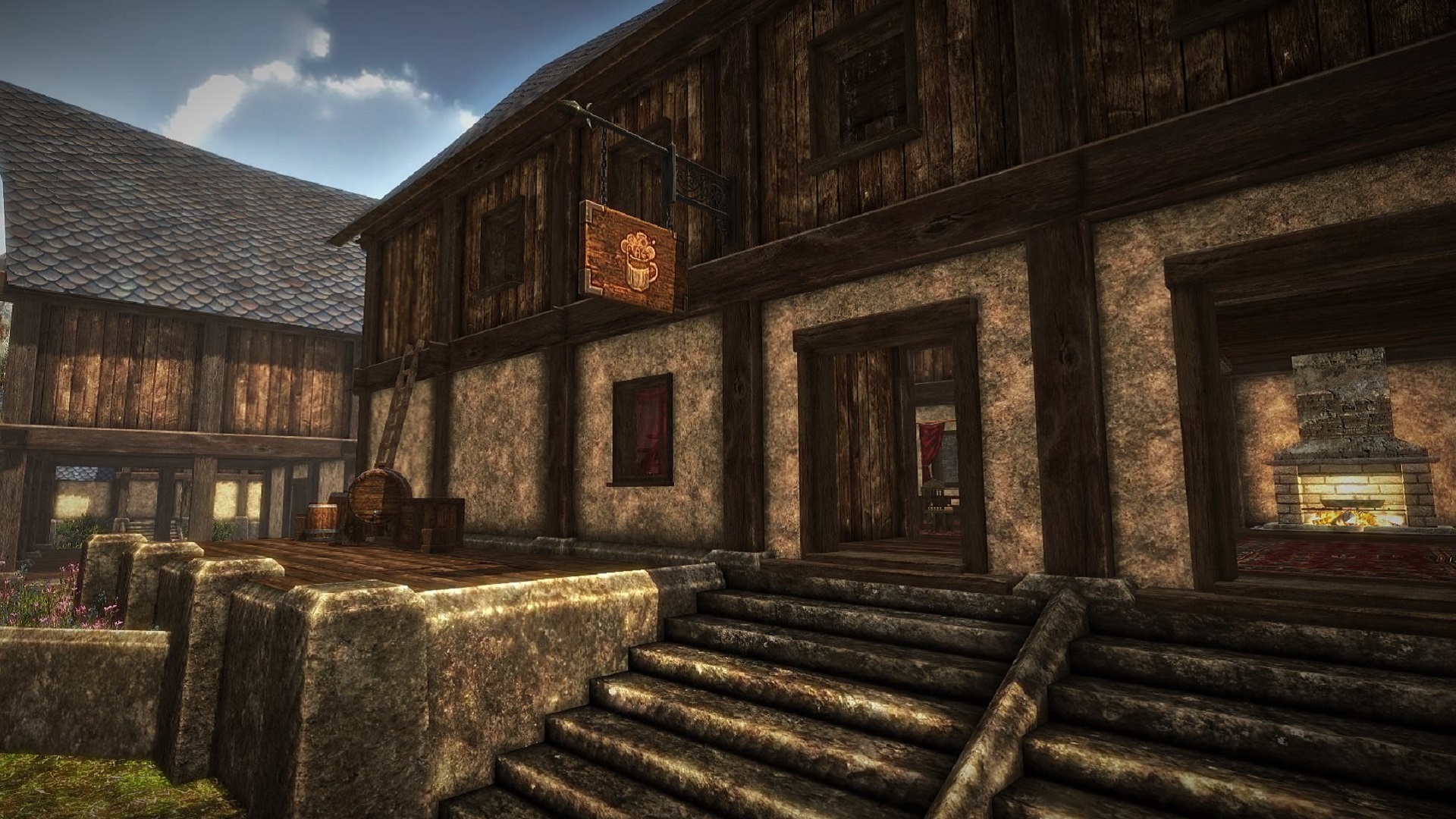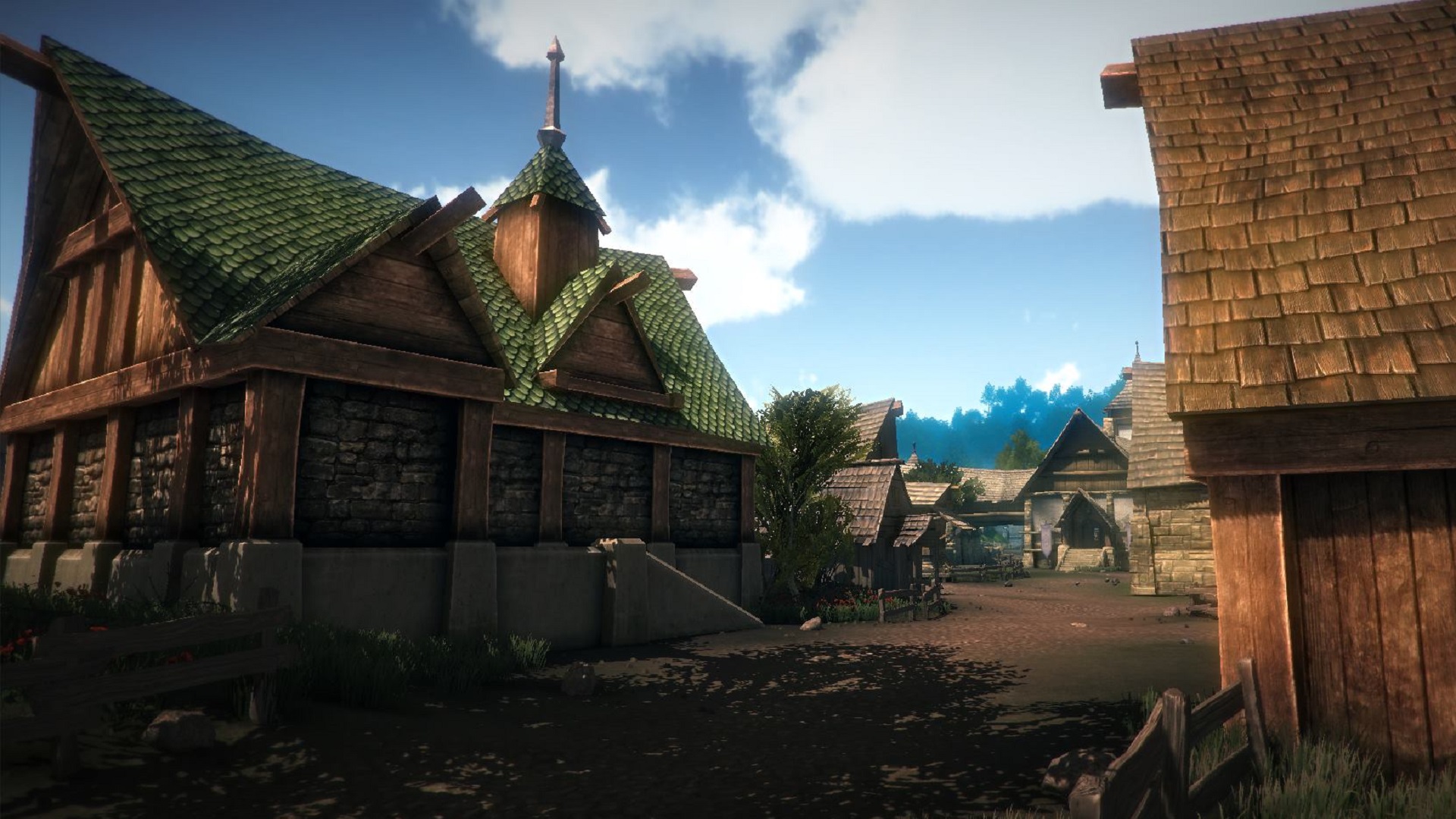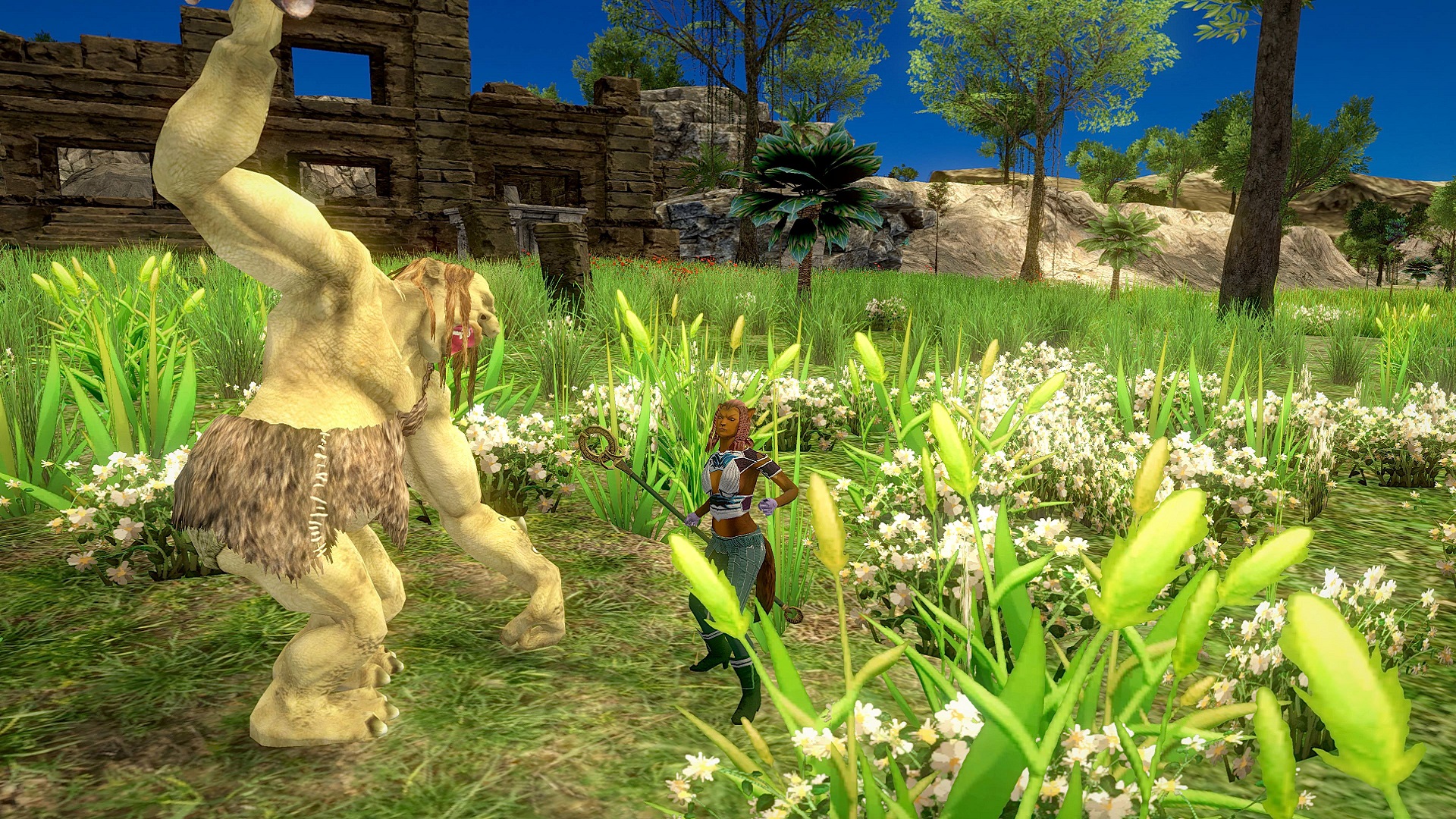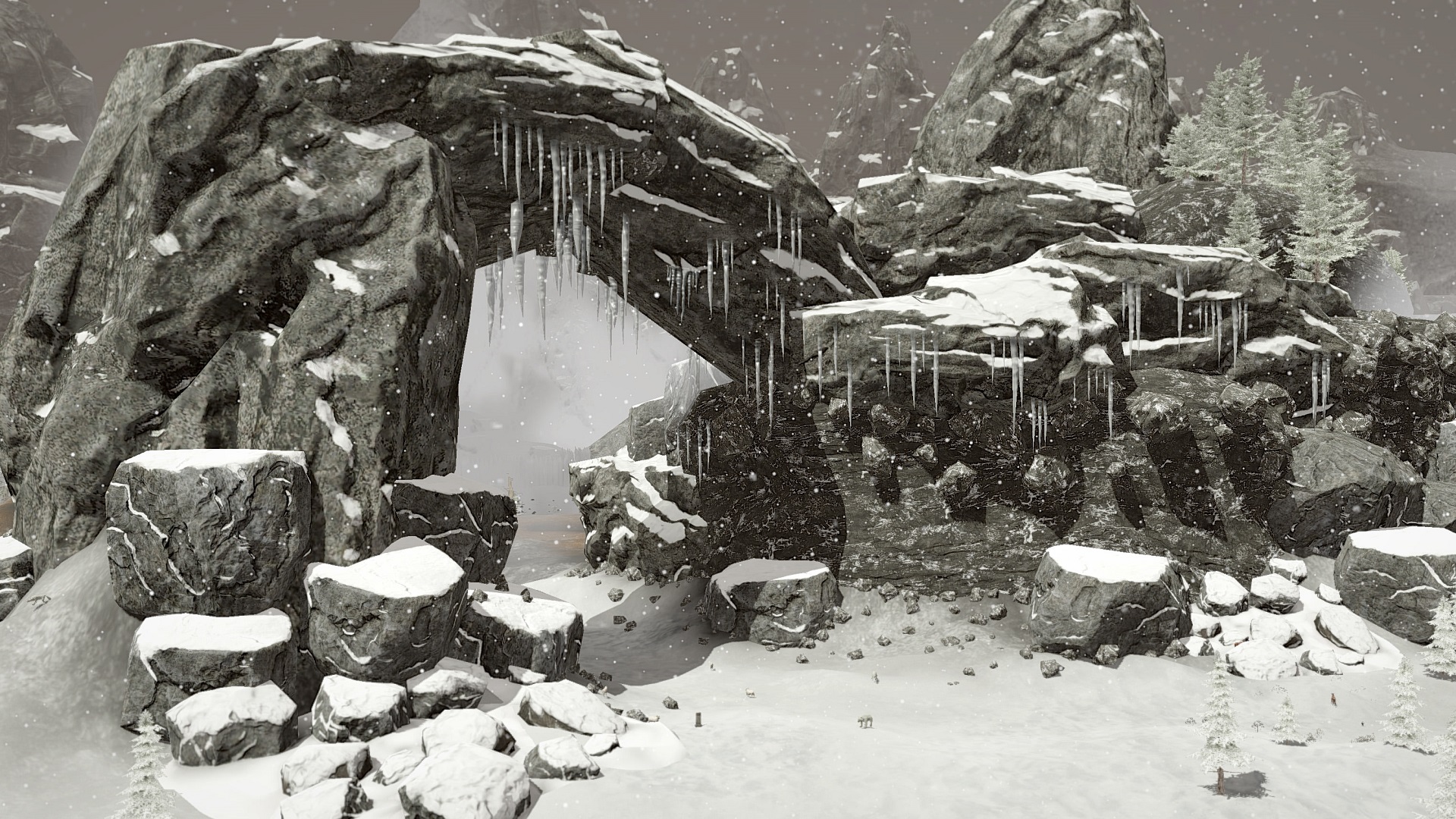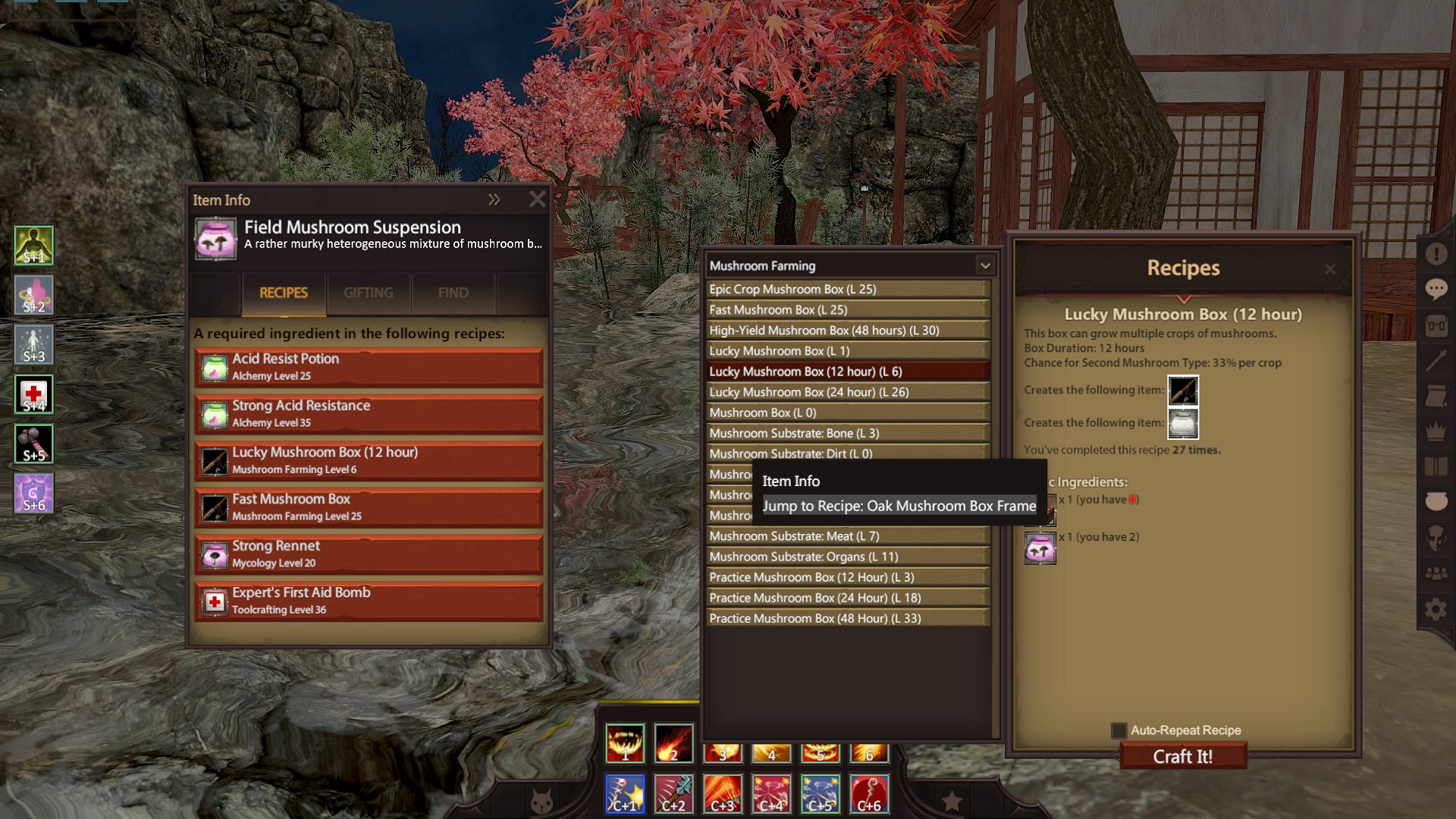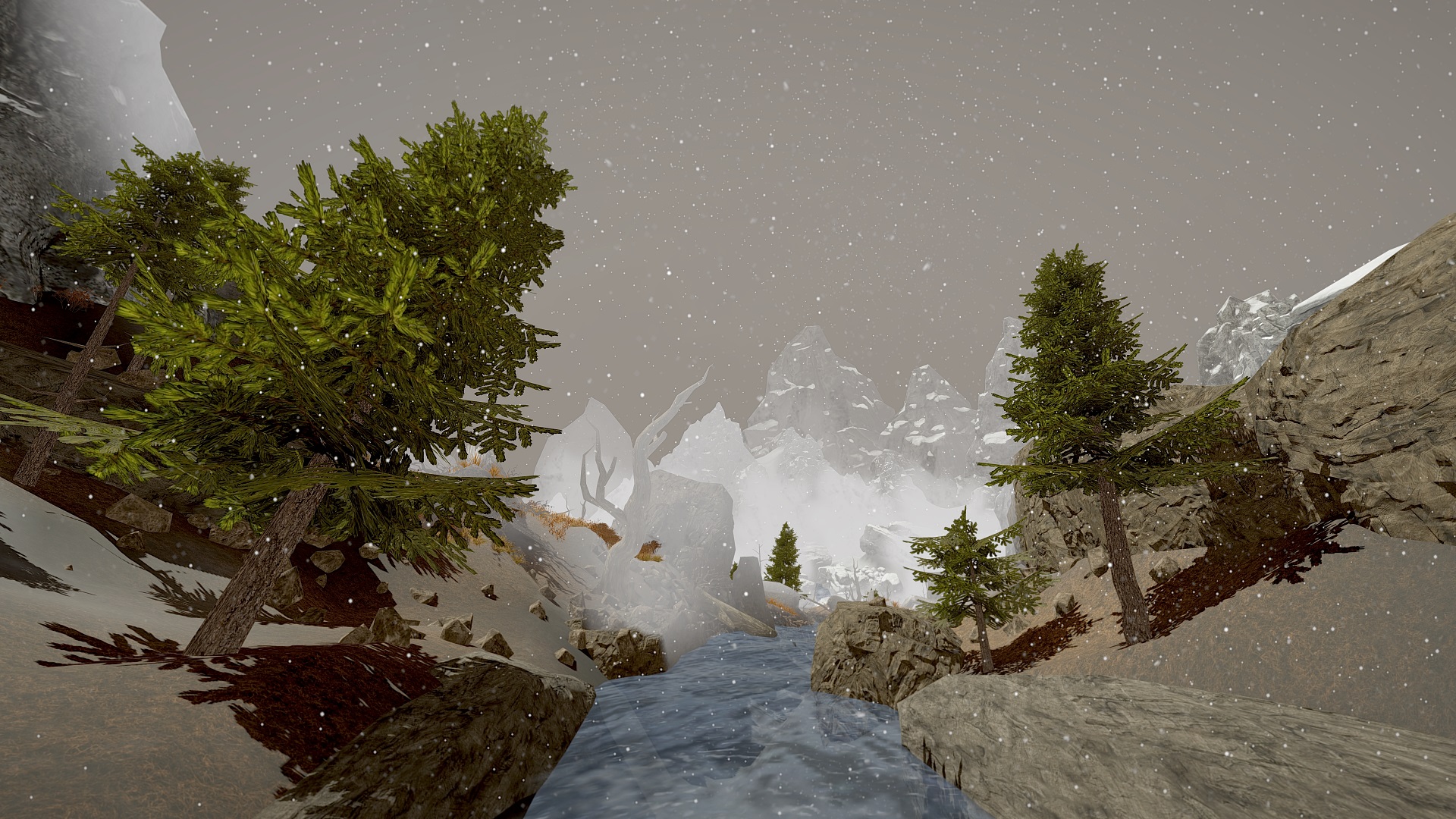
GO ON AN ADVENTURE
Project: Gorgon is a 3D fantasy MMORPG (massively-multiplayer online role-playing game) featuring an immersive experience that allows the player to forge their own path through exploration and discovery. We don't guide you through a world on rails, and as a result, there are many hidden secrets awaiting discovery. Project: Gorgon also features an ambitious skill-based leveling system that bucks the current trend of pre-determined classes, allowing the player to combine skills in order to create a truly unique playing experience.
AN IMMERSIVE WORLD
When you play Project: Gorgon, we want you to feel as if you’re immersed in a whole new virtual world. Rather than trying to manage this with just graphics and excessive backstory, we’ve designed the game with dozens of gameplay features that make you feel like you’re really there interacting with the world, such as:
- Each non-player (NPC) you meet has their own goals and interest, and reward players that choose to be their friend.
- You can drop items on the ground, and other players can pick them up. What’s so great about that? Imagine laying down a trail of literal (virtual) breadcrumbs to guide your friends (or lure your enemies) into the woods.
- Shopkeepers keep inventory, so you can buy items that other players have sold to them. Want to help out new players? Sell your cast-off items to the shopkeeper in the new player zone and watch the new players go to town.
- If you are on fire, you can jump into a lake to put it out. This type of mechanic can have a subtle effect on your strategies, especially when you are fighting a fire mage!
- You can inscribe messages onto items, write books, and even leave notes for other players. Make your name as an in-game poet, or pronounce your greatness to the world!
In Project: Gorgon you kill monsters - a lot of them - and you take their loot. In order to keep the experience fun and interesting, we’ve developed unique combat experiences to keep the fights feeling fresh. The loot is randomly generated, monsters have unique abilities, and dungeons have puzzles, traps, and terrifying bosses! The combat skills are entirely free-form. You can learn as many combat skills as you want, and use any two of them at the same time to create your own personal “class.” Project: Gorgon features dozens to choose from, including:
- Battle Chemistry: Create huge explosions, inject yourself with mysterious mutagens or program a pet golem!
- Unarmed Combat: Grapple and control enemies using a situational-aware combo system that varies based on where you are and what day it is.
- Animal Handling: Tame animals and train them to become ferocious fighters. Then breed your best and sell their offspring to other players.
- Necromancy: Seek out corpses and graveyards to raise an undead army. No graveyard around? Well, there are always the corpses of your friends.
- Cow: Got turned into a cow by that boss? That sucks. But learn some kicks and how to stampede, and you'll be right back out there kicking grass in no time!
- That’s just a few! There’s also Sword Fighting, Combat Psychology, Staff Fighting, Sigil Scripting, Mentalism, and more.
You can become a Druid - which will give you great power, but you have to vow to drop everything when there’s an emergency involving nature. It could be a forest fire, a monster invasion or even a pesky insect. Nature never lets you ignore your duties, ever.
New opportunists come open, but others will be closed. Can you bear heavy burdens in exchange for greater power?
JOIN THE COMMUNITY
The community is a critical aspect of Project: Gorgon. We strive to maintain a strong, engaged community, supporting our players through:
- Live Events with a focus on story.
- Mechanisms For player-created quest content.
- Player housing (limited and instanced).
- Player-managed shops and vendor stalls.
- In-game communication tools like bulletin boards.
- Bookshelves where you can write and submit your own books and stories (and players can vote on their favorites).
During our beta ("early access") period, your feedback helps improve the game, from small things like bug-reports to large things like new skill suggestions, monster ideas, and more! We've already used hundreds of player-provided suggestions during our alpha period, and we'll use even more suggestions during beta as we get into the down-and-dirty details of combat, crafting, and exploration.
Dev Blog: Let's Brainstorm about Housing
And if you're thinking "housing isn't fun", then that's exactly what I'm talking about. I'm not adding housing to check off a feature list. I'm adding it because I think it can be amazing!
The most immediate problem with landscape housing is that it doesn't scale. We'd start by adding hundreds of homes to the game, filling every nook and cranny of the existing world with houses... but that wouldn't even come CLOSE to letting every player have a house! It would only let the richest players buy one.
What about the thousands of other players? Well, everyone who plays must eventually be able to have a home, so we'd obviously need thousands more homes. We'd need to add new areas to the game just to have a place to stick their houses. You may have seen areas like that in other MMOs: for practical reasons, they're not very fleshed out. They're just places to stick houses. At that point, the houses might as well be instanced. It's not like their home is in the "real" game world anyway!
The second problem is that landscape housing eventually creates barren, empty game areas. At first, there's a decent chance that some of the homeowners will be in their houses while you log in, so the place might seem bustling and active. But after a year or two, that's never true. Players who own those homes will eventually stop playing... but they won't give up their homes. They'll log in just long enough to pay the upkeep costs of their house, then leave again. This creates ghost towns.
The only way to fix this is to force players to lose their homes if they don't keep playing - for example, by having arduous rental requirements or minimum play times. But that feels kind of like blackmail to me: "Keep playing every month or we'll take your pretend house away." This really isn't a great long-term retention strategy, either, because MMO players tend to take breaks from their favorite game before returning a year or two later. They'll log in to see what's new... but if they realize that their beloved house is gone, they're likely to just log back out again. I want returning players to feel welcome.
(Old-school MMO companies generally LIKED this design, because it meant homeowners had to keep paying a monthly subscription fee forever. But we don't have a monthly subscription fee. We'll eventually have an optional VIP plan, but I want it to feel truly optional, not something you'd need to own a house!)
The third problem of landscape housing is that it "locks in" parts of the game world. As these games mature and housing areas slowly feel more and more empty (due to all the homeowners who never log in), why don't game developers take steps to fix it? Because that would upset those homeowners!
Even adding monster-spawns to quiet areas will piss people off. If someone bought a landscape house because of its safety, they're going to feel betrayed if it stops feeling safe! There are a few other things that can be added, but for developers, it's mostly just too much work with too little reward. Instead of pissing off homeowners, devs are much more likely to create new areas instead. Those old barren areas are left to rot forever.
Lots of games implement instanced housing, mostly just to tick off boxes on their feature list. They add the expected features: some storage, some decorations, maybe a crafting table. In other words, they're pretty boring, so you're forgiven for thinking instanced housing HAS to be boring. But it doesn't! In fact, this is a fertile area for new MMO designs, and I want to try some out.
I want housing to be integrated into the game's systems at a deeper level, so it can be a jumping-off point for high-level player adventures and goals. There are opportunities here for gameplay that wouldn't make sense otherwise. Here's some ideas:
Suppose that when you go out the door of your instanced apartment, it leads to a hallway with a bunch of other doors -- each one dynamically assigned to be the doors of other people who are in their homes right now. You can knock on any door and say hi, and maybe come in to visit and look around. Or maybe you can slip a note under the door. Or sneak into their homes...
Or maybe that hallway leads to players that have been online recently, and who have left their houses in "open" security mode, so you can wander in and visit.
Or maybe the hallway leads to other active members of your guild, so your neighbors are always guildmates.
Or maybe we organize housing based on skill choices, so if you move into Explosion Heights with the other wizards, you can expect to encounter wizards... and wizard-related problems.
Because instanced houses aren't on the 'real' landscape, we can hook them together in ways that aren't constrained by real physics -- ways that create new gameplay. For example...
Or perhaps your apartment in the Statehelm slums is plagued by a mob of rat-men. They knock incessantly, demanding payment in cheese... do you dare answer? What happens if you don't? Do they try to set your house on fire? Or maybe they let pests into your vents. Or maybe they just sneak in and subtly move the furniture to enrage you... "Notice anything different? This wouldn't have happened if you'd left Roquefort on the mantle!"
Or maybe the visitor is your old friend Rita from Serbule. She's in town to do some shopping and wants to fill you in on the latest gossip. She says Sir Coth has started talking about "invisible intruders" again; maybe you should visit Serbule and see what's up?
Or perhaps the visitor at your door is just a salesman with a magic mirror to sell. "It shows serene pictures of nature when you're trying to go to sleep!" says the merchant. But after you buy it, something else happens...
Marriage has actually been part of Gorgon's rough design plan since the beginning -- for instance, the internal Favor Level above "Soul Mates" is called "Married" -- But that doesn't mean I've figured out how everything will work. It'll take experimentation to learn what sorts of mechanics are fun and scalable.
Right now, the exact game mechanics are completely open. Marriage could have its own Marriage Mood Meter, and different moods could trigger all sorts of behaviors depending on the NPC you married. Tantrums, fights, sulking, subterfuge... or lovely gifts, cozying by the fireplace, making you a delicious meal...
Or your spouse may have their friends over for parties... which might lead to jealousy later if you paid too much attention to their friends...
Or maybe one of their friends has gotten into serious trouble. There's a mystery to figure out, and your spouse has stakes in the outcome.
Or maybe their friends bring over an exotic housewarming gift with some unusual properties...
I think different NPCs would have very different marriage experiences. Some would crave cozy domesticity; others might have freaky demands for new sex toys every week; some might suffer from depression and need extra support, while others keep inviting their friends over every night and insist that you keep the icebox stocked!
Rakshasa have only had non-arranged marriages for a few decades, so they may have a lot of trouble settling down. And surely some elves have difficulty marrying a non-elf... knowing that they're going to outlive their spouse by hundreds of years might make it hard to have real emotional bonding. And if you marry a mage, are they going to feel jealous of your skill when you inevitably out-level them? What are the repercussions?
Of course, housing will also be an opportunity to decorate, to craft, to store items, all the usual stuff. But one of my goals with this game is to dig deeper than most MMOs do, and find the fun ideas that they don't reach. So what sounds fun to you? What outlandish thing do you want to do in your imaginary home?
PS - Most of these design ideas could apply to guild halls too! We plan to eventually add instanced Guild Halls, so that every guild can have a meeting spot. (A handful of the most expensive Guild Halls will also have non-instanced lobbies or exteriors, where the guild could set up vendors or signposts or things like that... but the majority of the place will be instanced.)
[This blog post is from the developer, Citan.]
Discuss this blog post on our main forums here!
(This started out as a forum post but got too big and became a blog post. The Fairy race blog post is about a week away, I expect.)
Let's Brainstorm About Housing
We're deep in the middle of coding the playable Fairy race, and after that we've got a new dungeon lined up, and after that there's a major city to add! So why talk about housing now? Because that city, Statehelm, is also where we'll introduce housing later in the year. Now is the time to brainstorm housing, to let the wild ideas percolate, to figure out what might be fun.And if you're thinking "housing isn't fun", then that's exactly what I'm talking about. I'm not adding housing to check off a feature list. I'm adding it because I think it can be amazing!
Landscape vs. Instanced? Already Settled
First, let's get the landscaped-vs-instanced question out of the way: we won't be using landscape housing. That's when the houses exist in the regular, non-instanced world, and each house can be bought and owned by one player. This design seems the most immersive at first. Who wouldn't want to own part of your favorite game city? But in practice, landscape housing is always terrible. (Except in pure PvP games, where landscape housing has a different function and can work well... but this isn't a PvP game!)The most immediate problem with landscape housing is that it doesn't scale. We'd start by adding hundreds of homes to the game, filling every nook and cranny of the existing world with houses... but that wouldn't even come CLOSE to letting every player have a house! It would only let the richest players buy one.
What about the thousands of other players? Well, everyone who plays must eventually be able to have a home, so we'd obviously need thousands more homes. We'd need to add new areas to the game just to have a place to stick their houses. You may have seen areas like that in other MMOs: for practical reasons, they're not very fleshed out. They're just places to stick houses. At that point, the houses might as well be instanced. It's not like their home is in the "real" game world anyway!
The second problem is that landscape housing eventually creates barren, empty game areas. At first, there's a decent chance that some of the homeowners will be in their houses while you log in, so the place might seem bustling and active. But after a year or two, that's never true. Players who own those homes will eventually stop playing... but they won't give up their homes. They'll log in just long enough to pay the upkeep costs of their house, then leave again. This creates ghost towns.
The only way to fix this is to force players to lose their homes if they don't keep playing - for example, by having arduous rental requirements or minimum play times. But that feels kind of like blackmail to me: "Keep playing every month or we'll take your pretend house away." This really isn't a great long-term retention strategy, either, because MMO players tend to take breaks from their favorite game before returning a year or two later. They'll log in to see what's new... but if they realize that their beloved house is gone, they're likely to just log back out again. I want returning players to feel welcome.
(Old-school MMO companies generally LIKED this design, because it meant homeowners had to keep paying a monthly subscription fee forever. But we don't have a monthly subscription fee. We'll eventually have an optional VIP plan, but I want it to feel truly optional, not something you'd need to own a house!)
The third problem of landscape housing is that it "locks in" parts of the game world. As these games mature and housing areas slowly feel more and more empty (due to all the homeowners who never log in), why don't game developers take steps to fix it? Because that would upset those homeowners!
Even adding monster-spawns to quiet areas will piss people off. If someone bought a landscape house because of its safety, they're going to feel betrayed if it stops feeling safe! There are a few other things that can be added, but for developers, it's mostly just too much work with too little reward. Instead of pissing off homeowners, devs are much more likely to create new areas instead. Those old barren areas are left to rot forever.
Instanced Housing Doesn't Have to Be Boring
We can side-step all of those problems by using instanced housing. Instanced housing is where the door to your home is in town, but when you go through that door, you appear in a private mini-area. Lots of players can use the same door in town, and each enters their own "instance" of the interior area.Lots of games implement instanced housing, mostly just to tick off boxes on their feature list. They add the expected features: some storage, some decorations, maybe a crafting table. In other words, they're pretty boring, so you're forgiven for thinking instanced housing HAS to be boring. But it doesn't! In fact, this is a fertile area for new MMO designs, and I want to try some out.
I want housing to be integrated into the game's systems at a deeper level, so it can be a jumping-off point for high-level player adventures and goals. There are opportunities here for gameplay that wouldn't make sense otherwise. Here's some ideas:
Meet the Neighbors
Just because your house is instanced doesn't mean you can't have player neighbors. Quite the opposite! We can avoid the big barren areas of non-instanced housing by using the reality-bending power of instancing. For example, in an instanced neighborhood we could dynamically group players based on who's online.Suppose that when you go out the door of your instanced apartment, it leads to a hallway with a bunch of other doors -- each one dynamically assigned to be the doors of other people who are in their homes right now. You can knock on any door and say hi, and maybe come in to visit and look around. Or maybe you can slip a note under the door. Or sneak into their homes...
Or maybe that hallway leads to players that have been online recently, and who have left their houses in "open" security mode, so you can wander in and visit.
Or maybe the hallway leads to other active members of your guild, so your neighbors are always guildmates.
Or maybe we organize housing based on skill choices, so if you move into Explosion Heights with the other wizards, you can expect to encounter wizards... and wizard-related problems.
Because instanced houses aren't on the 'real' landscape, we can hook them together in ways that aren't constrained by real physics -- ways that create new gameplay. For example...
The Front Door
Every house has a door, and we can use this to let adventures come to you. Imagine you come home just in time to hear a knock on your door. It's your neighbor: he asks you to deal with the foul odor coming from your basement. What odor? "The movers brought in those coffins yesterday, so I assume that's the stench!" What movers? What basement?! (Okay, discovering that you have a secret basement may be too far. Or maybe not... the basement door could teleport you to a different mini-dungeon depending on what quest is going on.)Or perhaps your apartment in the Statehelm slums is plagued by a mob of rat-men. They knock incessantly, demanding payment in cheese... do you dare answer? What happens if you don't? Do they try to set your house on fire? Or maybe they let pests into your vents. Or maybe they just sneak in and subtly move the furniture to enrage you... "Notice anything different? This wouldn't have happened if you'd left Roquefort on the mantle!"
Or maybe the visitor is your old friend Rita from Serbule. She's in town to do some shopping and wants to fill you in on the latest gossip. She says Sir Coth has started talking about "invisible intruders" again; maybe you should visit Serbule and see what's up?
Or perhaps the visitor at your door is just a salesman with a magic mirror to sell. "It shows serene pictures of nature when you're trying to go to sleep!" says the merchant. But after you buy it, something else happens...
Marriage
One of the big benefits of instancing is that NPCs can be instanced too, and they can behave differently inside your home than they do outside. This means you can marry an NPC and unlock all sorts of new behaviors. We've seen the beginnings of fun marriage systems in games like Skyrim, but they're rarely very deep.Marriage has actually been part of Gorgon's rough design plan since the beginning -- for instance, the internal Favor Level above "Soul Mates" is called "Married" -- But that doesn't mean I've figured out how everything will work. It'll take experimentation to learn what sorts of mechanics are fun and scalable.
Right now, the exact game mechanics are completely open. Marriage could have its own Marriage Mood Meter, and different moods could trigger all sorts of behaviors depending on the NPC you married. Tantrums, fights, sulking, subterfuge... or lovely gifts, cozying by the fireplace, making you a delicious meal...
Or your spouse may have their friends over for parties... which might lead to jealousy later if you paid too much attention to their friends...
Or maybe one of their friends has gotten into serious trouble. There's a mystery to figure out, and your spouse has stakes in the outcome.
Or maybe their friends bring over an exotic housewarming gift with some unusual properties...
I think different NPCs would have very different marriage experiences. Some would crave cozy domesticity; others might have freaky demands for new sex toys every week; some might suffer from depression and need extra support, while others keep inviting their friends over every night and insist that you keep the icebox stocked!
Rakshasa have only had non-arranged marriages for a few decades, so they may have a lot of trouble settling down. And surely some elves have difficulty marrying a non-elf... knowing that they're going to outlive their spouse by hundreds of years might make it hard to have real emotional bonding. And if you marry a mage, are they going to feel jealous of your skill when you inevitably out-level them? What are the repercussions?
Fertile Grounds for Fun Ideas
None of these ideas are especially well thought out, obviously. This is brainstorming! But I'm excited about the possibilities, and I'd like to hear what ideas interest you.Of course, housing will also be an opportunity to decorate, to craft, to store items, all the usual stuff. But one of my goals with this game is to dig deeper than most MMOs do, and find the fun ideas that they don't reach. So what sounds fun to you? What outlandish thing do you want to do in your imaginary home?
PS - Most of these design ideas could apply to guild halls too! We plan to eventually add instanced Guild Halls, so that every guild can have a meeting spot. (A handful of the most expensive Guild Halls will also have non-instanced lobbies or exteriors, where the guild could set up vendors or signposts or things like that... but the majority of the place will be instanced.)
[ 2020-02-15 00:23:20 CET ] [Original Post]
Minimum Setup
- OS: Ubuntu 18.04
- Processor: Intel Core 2 DUO 2.4 GHz / AMD Athlon X2 2.7 GHzMemory: 4 GB RAM
- Memory: 4 GB RAM
- Graphics: ATI Radeon HD 3870 / NVIDIA 8800 GT / Intel HD 4000 Integrated GraphicsNetwork: Broadband Internet connection
- Storage: 10 GB available space
Recommended Setup
- OS: Ubuntu 18.04
- Processor: Quad Core Processor 2.4GHz or fasterMemory: 8 GB RAM
- Graphics: AMD Radeon R9 / NVIDIA GeForce GTX 1070Network: Broadband Internet connection
- Storage: 10 GB available space
GAMEBILLET
[ 6409 ]
FANATICAL
[ 6591 ]
GAMERSGATE
[ 2652 ]
MacGameStore
[ 4909 ]
FANATICAL BUNDLES
HUMBLE BUNDLES
by buying games/dlcs from affiliate links you are supporting tuxDB

